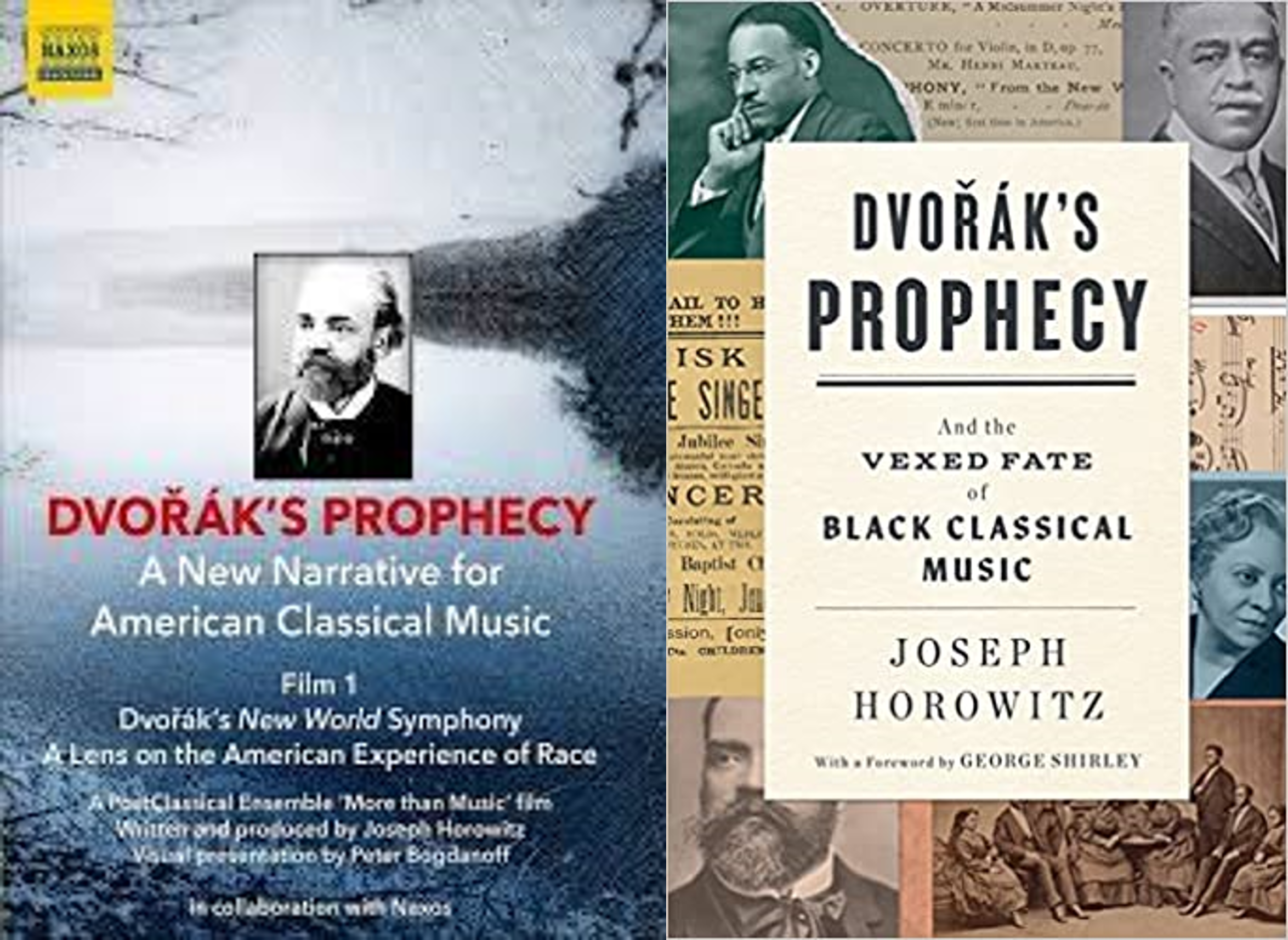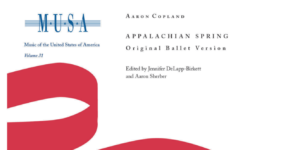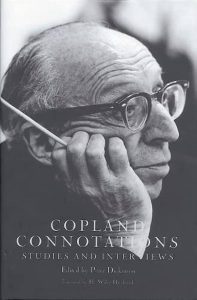
You’ve got to hand it to the team at Post Classical Ensemble – the “experimental music laboratory” based in Washington DC are constantly opening new doors and sharing their enthusiasm for American music through different media and championing the lesser-known works of composers like Bernard Herrmann, Lou Harrison and Silvestre Revueltas. Over the last decade they have recorded some excellent CDs and DVDs for Naxos and now they have produced a series of films that look back over 130 years of musical heritage since the Bohemian composer Antonin Dvořák penned his New World Symphony and prophecised that there would be a “great and noble” school of American classical music based on searing “negro melodies”
There are six 60-80 minute films in all in the series titled Dvořák’s Prophecy: A New Narrative for American Classical Music:
- Dvořák’s New World Symphony: A Lens on the American Experience of Race
- Aaron Copland: American Populist
- Beyond “Psycho” – the Genius of Bernard Herrmann
- Lou Harrison and Cultural Fusion
- Charles Ives’ America
- SOULS of Black Folk and the Vexed Fate of Black Classical Music
The films are excellent, erudite, intriguing and approachable. There are lots of musical excerpts and insightful commentary from many performers and scholars. I don’t always agree with all of the points made but at every stage you are made to think, ask questions and encouraged to delve deeper. The series was written by eminent music author and critic Joseph Horowitz. If I was to come up for a blueprint on how to present American music history to all ages this would be it. I wholeheartedly recommend anyone interested in music to watch them.
The Naxos discs are being launched in conjunction with Horowitz’s book Dvořák’s Prophecy and the Vexed Fate of Black Classical Music. The book is no less scholarly but unfortunately wasn’t quite what I hoped it would be.
Considering the title and the fact that three of the four faces on the cover are of black composers (William Levi Dawson, Harry Burleigh and Florence Price), I think most readers like me, will be expecting a book almost exclusively about black classical music. So, it was a real surprise just how much of the book is actually about Gershwin, Ives, Copland and Twain, Emerson, Hawthorne and Whitman – i.e. a load of white blokes!
The book seeks to redress what Horowitz views as the received wisdom as put forward by Aaron Copland, Virgil Thompson and Leonard Bernstein that there was no “useable past” that could be deployed to create authentic American sounding music. Horowitz argues that the failure of the modernists to accept the sorrow songs of African American slaves meant that classical music in America stayed largely white.
This is an interesting view but for me does feel like looking for grassy knolls when there are much more obvious reasons why black music didn’t make it into the concert hall. Institutional racism and segregation of orchestras and in venues is mentioned but only really in passing and quite a good chunk into the book.
For me, too much focus is given to the Gilded Age and the defence of nostalgia. Chapter 6 and parts of the first chapter deal with the stuff that I am really interested in – namely black composers and their plight. (About 30 pages of the 201 total deal solely with black composers). They were actually using the “useable past” and producing some incredible music. I have since listened to William Levi Dawson’s Negro Folk Symphony composed in 1934, a piece that Horowitz describes as “buried treasure”, and have to agree that it’s a knock out. I can really understand why it “took the house by storm” at the premiere. It’s such a shame that prejudice stopped more music like this from being played, published, commissioned or revived.
One missed opportunity from the past that is mentioned but not really commented on is that Eleanor Roosevelt was present at the premiere of Florence Price’s Third Symphony in 1940. She warmly praised the composition in her syndicated column. Considering that so many American classical music works of notoriety were commissioned by women of wealth it seems appalling that the First Lady’s reflections on an evening of “profound melodic satisfaction” weren’t pounced upon by people of influence. Unfortunately, this tells an all to familiar and depressing story of neglect and ignorance due to inherent racism.
It’s obvious that Horowitz doesn’t really care that much for a lot of Copland’s output which is fine. But as a Copland fan I feel that some of the commentary is unfair and not always true. I admire the fact that Copland was able to assimilate so many different styles in his music and often exhibit gritty realism of city streets, dance halls and western ranches, so I disagree with the slightly barbed description of him being a “synthetic populist”. Also, I think you’d have to go a long way to find someone else who would describe Copland as “no tunesmith”.
But the thing that is never really explained is just what good it would have done had Copland and the other modernists used the Gilded Age vernacular? If more white composers had appropriated spirituals would that really have helped black composers get more of a foothold? Personally, I doubt it. I think that black classical music composers would probably have had the same raw deal as they had anyway.
Like Horowitz I am very keen to hear more diversity and variety in the concert hall and certainly I want more programming of William Grant-Still, Price, Dawson and Burleigh but that doesn’t make me want to hear less Copland, Thompson, Samuel Barber or even Roy Harris (who personally I think was no tunesmith). Like it or not many great works of 20th and 21st century American classical music are not heard anywhere near enough. We both want that to change.
Despite providing new insights and interesting views, overall, I found the book hard to read. Not because I’m a Copland fan but because compared to the films the language used is unfortunately too high brow. I have two degrees (not in English or the classics) but I found I was reaching for the dictionary pretty much every page. Words like “feuillitons” “sui generis” “praxis” “exigent” “innerlichkeit” “ur-narrative” “heuristic” “lodestar” “encomium” and even “bifurcation” are not part of the common parlance. As such it comes across as elitist which is odd in a book that is seeking to break down barriers and seemingly contrary to the ethos of PCE and the very inclusive and easy to follow films.
As such it was like expecting to hear Mozart and being served up Connotations! That’s not to say that this level of erudition doesn’t have a great deal of merit but it probably will be a turn off to some.
Other elements of the text that jarred with me are what I consider to be out of date terminology for ethnic peoples. I am sure I am not alone in preferring that the use of “Indian” to be replaced by “Native American” or “First Nation”. This said, there is no suggestion that this is used in a pejorative context.
So overall these are two really important, commendable and thought provoking works but the Dvořák’s Prophecy films are the best starting point if you wish to get a measured, succinct and easy to digest view of why black classical music has been for too long neglected and marginalised.
Book details:
- Hardcover: 256 pages
- Publisher: WM Norton and Company (10 Dec 2021)
- Language: English
- ISBN-978-0-393-88124-0
If you would like to read some different views on Copland’s parallels with Gershwin and Ives and his dalliances with jazz then I recommend the following articles all of which appear in the book Copland Connotations: Studies and Interviews Edited by Peter Dickinson
- Copland and the ‘Jazz Boys’ – David Schiff
- Copland, Gershwin and the American Landscape – Howard Pollack
- Copland, Ives and Gambling with the Future – Larry Starr






Leave a Comment